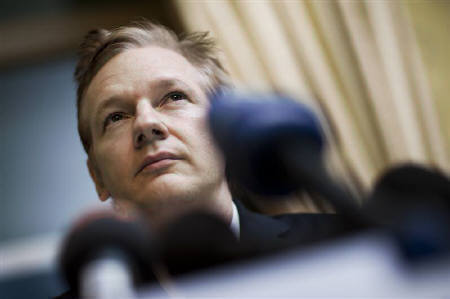2011-11-07 WikiLeaks' Assange must be protected
Authored by William Shaub

Julian Assange has become more than an agent of transparency; he’s our resourceful David in a 21st century fight against thousands of steroid-enhanced Goliaths.
Australia’s The Age is reporting what many of us familiar with the WikiLeaks saga have foreseen:
Kevin Rudd and his foreign affairs department have been accused of all but ignoring pleas from Julian Assange’s legal team to protect the WikiLeaks founder from a possible death penalty in the US.
The foreign affairs department may have also been caught out in an embarrassing lie, after telling The Age they had replied to a letter from Assange’s British lawyer, Gareth Peirce, when they had not.
Tony Kevin, an Australian diplomat of three decades who served as ambassador to Poland and Cambodia, was critical of Mr Rudd’s handling of the Assange case, saying Australia appeared unprepared to grapple with its highly political nature.
Indeed, Australia is not the only country “unprepared to grapple” with the highly political nature of Julian Assange’s court case, but perhaps the most important. The US is not hesitating to use its ability of limiting the social sovereignty of other countries for the purposes of ‘security,’ and governments are clearly not interested in falling out of US favor. Thus, Australia is buckling to US political pressure and acquiring real complicity in Assange’s possible extradition to the US.
The result is the persecution of perhaps the most innovative web activist in history.
As an American citizen, I am not prepared to watch Julian Assange die at the hands of a public institution funded by my taxes. Losing him, regardless of WikiLeaks’ preservation as an organization, would prove to be a bitter setback in media progress by setting such a condemning precedent for expansion of free speech and free information.
This is a moment in history where American society is dominated by parasitic institutions. They are bent on infiltrating markets, personal liberty, and maintaining an unaccountable system of exploitation. Since the implementation of New Deal reforms and the end of the second world war, these public and private institutions have aggressively and bitterly fought public accountability. The recent global economic crisis reaffirmed their success in this fight, and revealed an unprecedented deficit of democracy. One must ask, if the mass media was doing its job—if journalists were doing (or were allowed to do) their jobs—would this crisis of democracy have happened?
The gap between what the media was doing and what it should have been doing was filled by WikiLeaks, which made institutional accountability a priority. With reference to this intention, many believe that “Wikileaks as a concept and a movement will continue indefinitely.” The New York Times, whose connections to Assange and WikiLeaks were halted as a result of confrontation with former editor-in-chief Bill Keller, barred no holds for Assange. “The idea of WikiLeaks and perhaps the organization itself will live on.” The Times and the media’s message is puzzling, however: transparency is alright, and “there’s no shortage of secrets,” but we can do without the guy who is dedicated to uncovering them.
Putting the inept media aside, don’t we, as American citizens, owe Assange something? Certainly not everything, given his self-described chauvinistic record and controversial attitude toward social change. Yet his ability to breath freely is the very least we can protect. Have activists and whistleblowers not benefited from the work of WikiLeaks? An organization built by less than ten hackers has managed to provide the anti-war movement with a higher degree of intellectual defense than the entire mass media combined.
To quote Assange from his blog in 2006,
“Every time we witness an injustice and do not act, we train our character to be passive in its presence and thereby eventually lose all ability to defend ourselves and those we love.”
Assigning the death penalty for crimes of cyber terrorism to Julian Assange is an injustice that the US population must not tolerate, if we have any inclination toward democratic values. When world governments are not able and willing to stand up to the US government, then we as citizens must do it ourselves. We must not be complicit by waiting until the last minute to make our voices heard. Let’s not wait to draw our line in the sand after Assange and WikiLeaks have been destroyed. We should draw it at his freedom, and nothing less.
A man who’s dedicated his life to informational justice does not deserve to die at the hands of the most accountable institution we as US citizens have: the government. Assange has become more than an agent of transparency; he’s our resourceful David in a 21st century fight against thousands of steroid-enhanced Goliaths. Simply appreciating what we have before it’s gone may not be an option in the fight for structural accountability: Assange’s absence would be too great a setback. We have all benefited from his work. Let’s show our appreciation by protecting his life and allowing him to keep doing it.